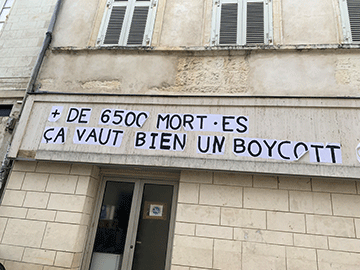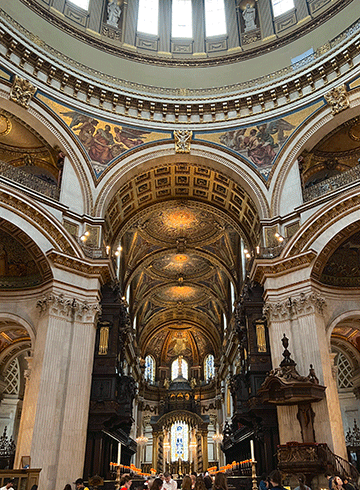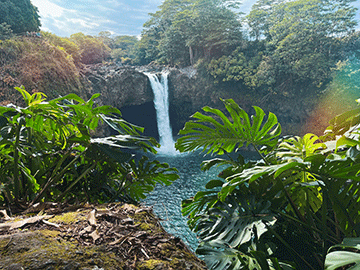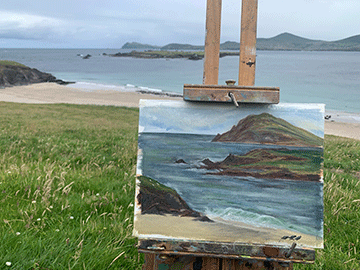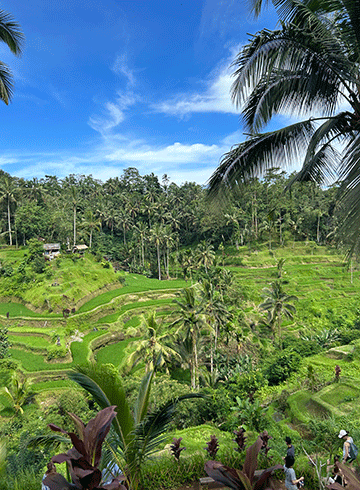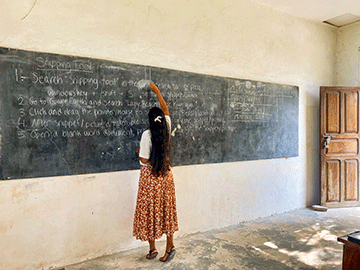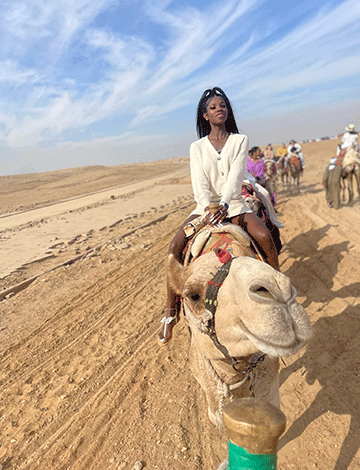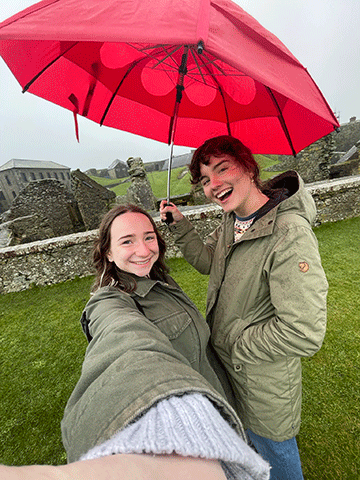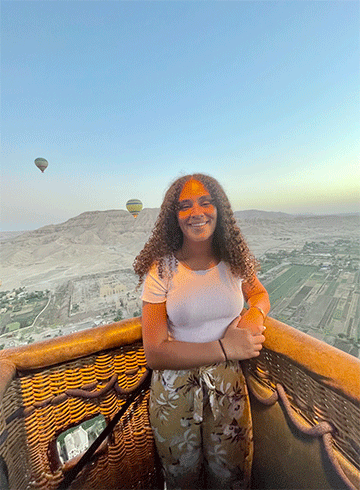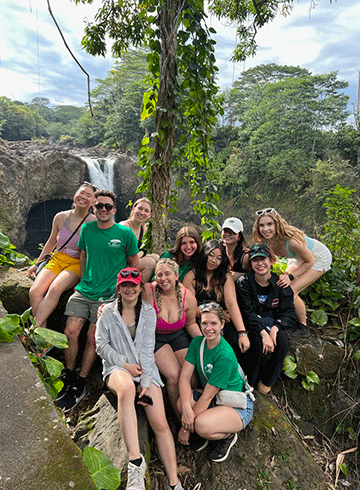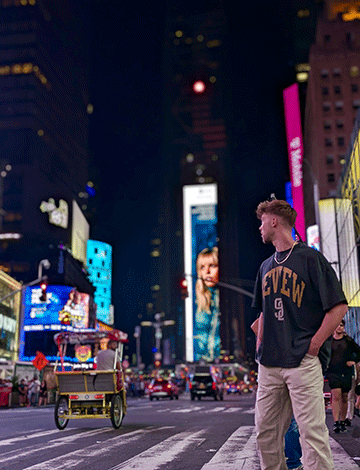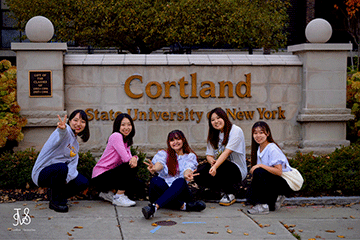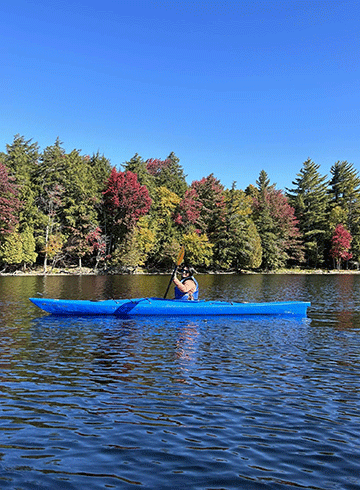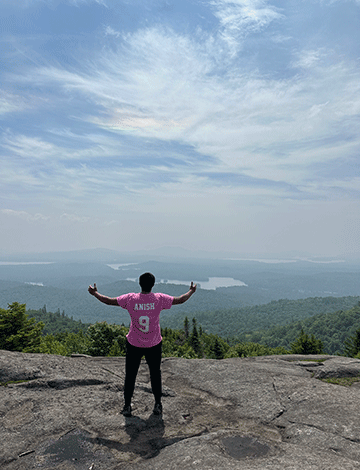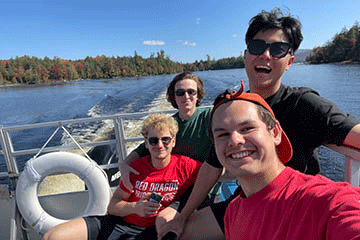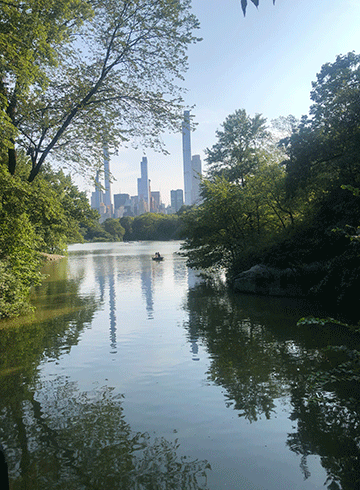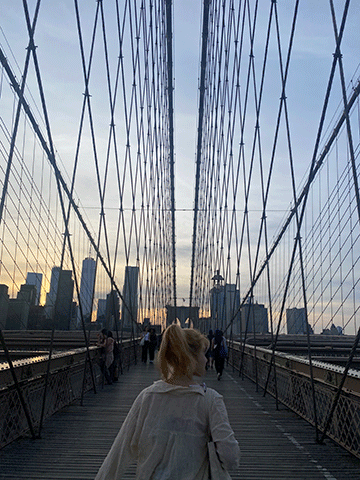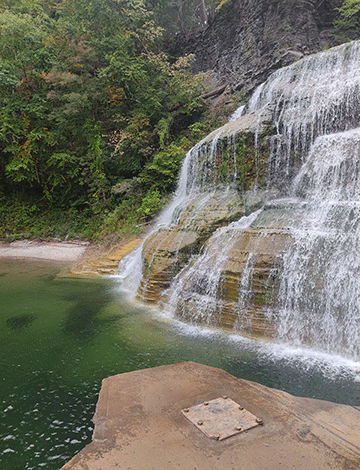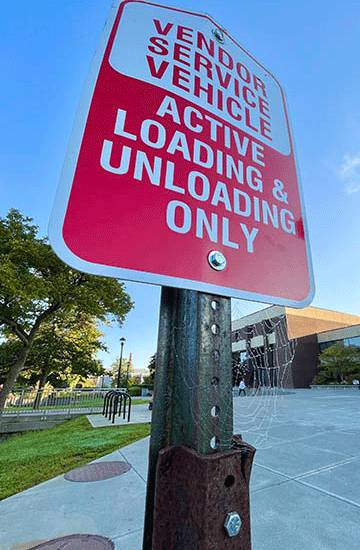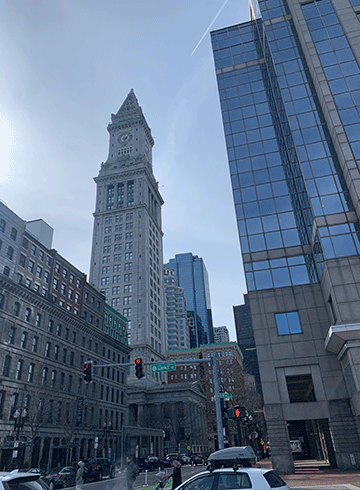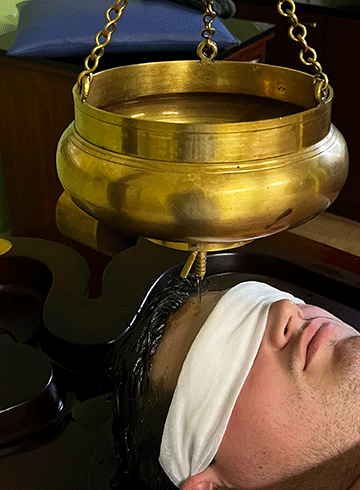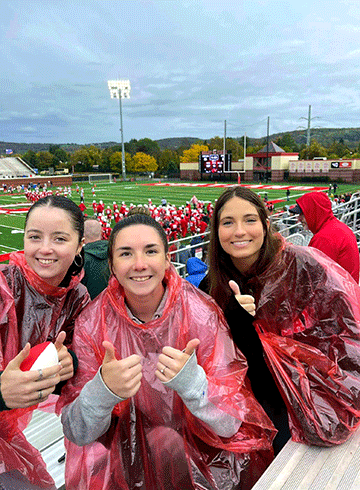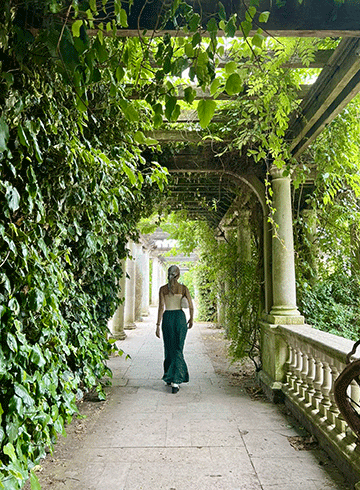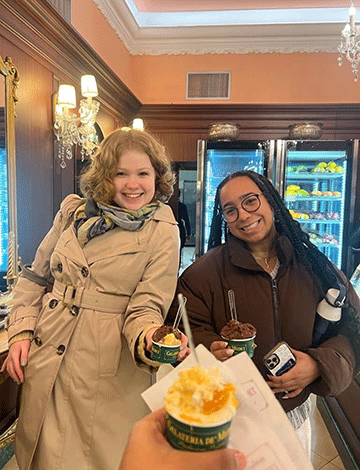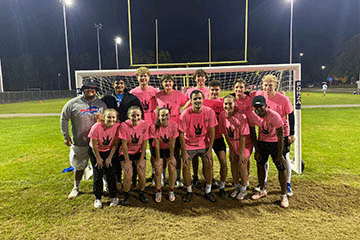
|
|
Issue Number 7 • Tuesday, Nov. 21, 2023 |
Campus ChampionEmily Thomas, an early childhood/childhood education major and outdoor and environmental education minor, is president of the Education Club, one of the university’s largest student clubs. From 70 to 130 students attend the biweekly meetings to hear speakers, share ideas and have fun that centers around education. Emily recently led the club’s first book drive. Reclaiming books left in storage by previous Education Club members, these were distributed free to student teachers and teachers from the community. Emily, who also works as an admissions tour guide, orientation assistant and childcare center worker, was thrilled by the book drive’s great turnout and positive feedback. Wednesday, Nov. 22Thanksgiving Break begins Monday, Nov. 27Classes resume Money Talks Monday - All About Credit: Online, register on Handshake, 4 to 5 p.m. Tuesday, Nov. 28Disability Resources Office Focus Groups: Corey Union Fireplace Lounge, 5 to 6 p.m. Wednesday, Nov. 29Disability Resources Office Focus Groups: Corey Union Fireplace Lounge, noon to 2 p.m. Sandwich Seminar: Workplace Diversity, Equity and Inclusion: Representatives of the UUP Diversity, Equity, and Inclusion Committee will speak about workplace DEI issues on a panel discussion, Old Main Colloquium, 12:30 to 1:30 p.m. Life After Cortland: Get Career Ready: Online, register on Handshake, 4 to 5 p.m. Thursday, Nov. 30Sandwich Seminar: Generative AI in Action - Pedagogies and Practices, Old Main Colloquium, noon to 1 p.m. Teacher Certification Overview: Online, register on Handshake, 6 to 7 p.m. Friday, Dec. 1Last day for in-class examinations Wednesday, Dec. 6Red Cross Blood Drive: Corey Union Exhibition Lounge, noon to 5 p.m. Click here to make an appointment. Networking and Job Search 101: Online, register on Handshake, 4 to 5 p.m. Teaching, Research, Service Awards Ceremony: Corey Union Function Room, 4:30 to 6:30 p.m. Friday, Dec. 8Classes end UUP Cortland Chapter Holiday Event: Cortland Beer Company, 4 to 7 p.m. Please RSVP to [email protected]. Monday, Dec. 11 to Friday, Dec. 15Final examination period Monday, Dec. 11 and Tuesday, Dec. 12PAWS For Stress Relief: Student Life Center, 3 Court Gym, noon to 4 p.m. |
Parks Alumni House wins $500,000 grant11/16/2023The SUNY Cortland Alumni Association this week won a $500,000 state grant to support restoration projects at the Lynne Parks ’68 SUNY Cortland Alumni House, a key structure in Cortland’s downtown historic district. The New York State Office of Parks, Recreation and Historic Preservation this week announced the award, which will restore the terrace veranda entrance of the mansion, addressing safety and accessibility concerns and ensuring its continued operation in the community. The elegant Tompkins Street mansion is owned by the alumni association, an independent, non-profit organization and used to host a variety of alumni, university and community events. The facility also provides office space for alumni engagement and campus event management personnel. “This grant is transformative,” said Erin Boylan, the association’s executive director. “It will allow us to make the capital repairs needed to maintain the building’s historical integrity while the Parks Alumni House continues to serve as the Cortland home for our more than 80,000 living alumni, a venue for university gatherings and a premiere event facility in our community. “We are so thankful to New York state, the Regional Economic Development Council program and the Office of Parks, Recreation and Historic Preservation department for their support. It will allow generations of SUNY Cortland students, alumni and community members to enjoy this magnificent structure.” The 15,000-square-foot mansion at 29 Tompkins St. was built in 1912 by Gilded Age industrialist Charles Wickwire, who eventually became president of Wickwire Brothers, Inc., on south Main Street in Cortland. The company was founded by his father, who invented an innovative wire mesh. It produced a wide variety of steel wire and related products and was one of the area’s largest employers. “One of our goals in maintaining and operating the Parks Alumni House is to help preserve the rich history of the Wickwire family and their impact on Cortland,” Boylan said. “We strive to be good stewards of this amazing property and use it to help educate the community about its heritage and pay tribute to a family that helped make Cortland what it is today.” The house is part of the Tompkins-Main Streets Historic District, which is listed on the National Register of Historic Places. “This is a wonderful recognition for the university’s alumni association,” said SUNY Cortland President Erik J. Bitterbaum. “The Parks Alumni House has served as an impressive events facility for many years, and this award will help with necessary accessibility improvements while maintaining the historic charm of the building. I am elated that this venue will continue to shine for our Cortland graduates as well as our local community.” Scientific minds meet at SUNY Cortland11/17/2023“Science Homecoming.” That’s what SUNY Cortland chemistry professor Frank Rossi calls a unique university tradition that brings students interested in science careers together with successful alumni scientists on the Cortland campus. The fall’s 8th annual Michael J. Bond ’75, M.D. Alumni/Undergraduate Science Symposium was the best attended yet, drawing an estimated 150 students, alumni and faculty to take part in seminars, research presentations, informal networking and student poster sessions. “It’s gone from this very small, intimate event to one where we have students presenting their research,” said Rossi, who chairs the chemistry department, serves on the Cortland College Foundation Board, and helped organize the original gathering of some 40 alumni and students in the basement of the Lynne Parks ’68 SUNY Cortland Alumni House. “From a students’ perspective, it provides an opportunity to present their research to people who are not their professors but are trained scientists. It’s often their first opportunity to do that … It’s the kind of experience they would have at a professional meeting.” The Bond ’75 Science Symposium was created to connect Cortland undergraduates and faculty with alumni researchers, demonstrating that important science careers are launched from SUNY Cortland with the experience gained through undergraduate research. They gather on campus to share stories, bounce ideas off one another and form connections that could be valuable to students thinking of research careers and graduate school. 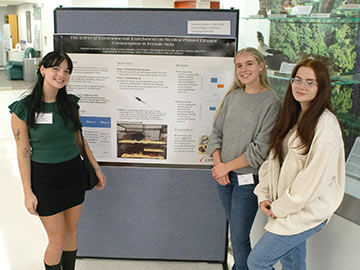
Three notable alumni presented at the Oct. 27 event to a standing-room-only crowd in the 130-seat Bowers Hall auditorium, introducing many first-year students to the science opportunities available at SUNY Cortland:
Between the alumni speakers, who focused on the value of their SUNY Cortland undergraduate research experiences in launching their careers, two student scientists presented research they’d done with a faculty mentor. Senior biochemistry major Zachary Turlington explained his work on enzymes involved in the process a specific bacterium uses to break down common pollutants found in skin care products. Senior biology major Trinity Tobin presented her research on developing a protocol to determine the genetic cause of different flower colors in tobacco plants. In addition, 18 students shared poster presentations in Bowers Hall during a “lab crawl” in which they explained their research to alumni, faculty and other students. Their scientific inquiries ranged across the fields of geology, biology, chemistry and psychology. 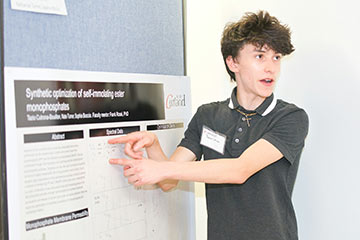
“The student presentations and posters were incredibly professional,” said SUNY Cortland Provost Ann McClellan. “I was so impressed by their comfort and knowledge with their material and their ability to engage with thoughtful, complex questions from the audience. “I brought a few academic friends with me from another institution, and they were so impressed with the intellectual level of our students and the impact of the event.” Undergraduate research develops independent critical thinking, creativity and problem-solving skills, and SUNY Cortland offers many opportunities for students through its Undergraduate Research Council. These include donor-supported undergraduate summer research fellowships, independent research projects for academic credit, research internships and more. Michael Bond ’75, M.D., who retired as the medical director of Advanced Dermatology and Cosmetic Surgery in Orlando, Florida, has funded the annual symposium through an endowment created with a significant planned gift. William Baerthlein ’76, M.D. has made a major gift to support the immediate needs of the symposium. A member of SUNY Cortland’s Academic Hall of Fame and the Cortland College Foundation board, Baerthlein is a physician whose scholarship and expertise on methods for delivering babies has greatly influenced reproductive medicine. Both men credit their undergraduate research experience at SUNY Cortland with positively influencing their career paths. And both participated in this year’s science symposium, offering opening remarks, introducing presenters, and talking with students and other attendees. “Students are presenting their undergraduate research, and they’re interacting with alumni,” Rossi said. Student presenters “are showing new students exactly what research is at SUNY Cortland.” Capture the MomentPresident Erik J. Bitterbaum joined the SUNY Cortland Cheerleading squad in celebrating the Red Dragons’ 38-28 victory over Ithaca College in this year’s Cortaca Jug game Nov. 11 at Ithaca’s Butterfield Stadium. “We asked him early in the game if, when we won, if we could put him in a stunt, said Cortland cheer coach Gillian Presto ’22. “He agreed and kept his word!” A video of the presidential stunt can be seen on the university’s Instagram page. In Other NewsInternational photo contest winners announcedSUNY Cortland’s International Programs Office recently announced the winners of its Fall 2023 photo contest. More than 400 voters from the campus community selected 25 student photos for awards across five categories. The winning images will be posted on the International Programs website in coming weeks. This year’s contest attracted more than 100 submissions by 57 students. The photos captured the experiences of both SUNY Cortland traveling abroad, and international students studying at SUNY Cortland and visiting sites in the U.S. The university’s International Programs Office currently manages more than 40 study abroad programs in countries ranging from Tanzania to Thailand, while helping Cortland students connect with hundreds of additional opportunities throughout the SUNY system. Almost 90 international students representing 24 countries also are enrolled at Cortland. The 2023 award winners are: World as Your Classroom CategoryFirst place: Maya Iwanejko, “More than 6500 Deaths, this is worth a boycott” — La Rochelle, France
Runner-up: Amelia Abbott, “St. Paul’s Cathedral” — London, England
Popular choice: Kelly Tait, “Hawaiian Beauty” — Hawaii
Honorable mention: Madison Hanford —“Blasket Islands” — Dingle, Ireland
Honorable mention: Stella Thayer: “Bali Rice Fields” — Bali, Indonesia
The Faces of Study Abroad CategoryFirst place: Meghan Goparaju “Teaching in Zanzibar” — Zanzibar, Tanzania
Runner-up: Meyah Douglas “The Pyramids of Giza” — Giza, Egypt
Popular choice: Olivia Svitak, “Forts, Rain, and Umbrella” — Ringcurran, Ireland
Honorable mention: Sara Mohamed, “Looking Over” — Luxor, Egypt
Honorable mention: Savannah Jordan, “Wailuku River” — Hawaii
Capture the Moment CategoryFirst place: Claas Hebenstreit, “NYC Night Chills” — New York, N.Y.
Runner-up: Rameen Zehra, “Kizuna” — Cortland, N.Y.
Popular choice: Shreya Dhital, “Kayaking at Raquette Lake” — Raquette Lake, N.Y.
Honorable mention: Anish Tokas, “The Algonquin Peak” — The Adirondacks, N.Y.
Honorable mention: Youenn Rollin, “Make the Most of the World Around You” — Raquette Lake, N.Y.
World of Wonder CategoryFirst place: Johannes Betz, “Take a Breath” — New York, N.Y.
Runner-up: Minju Kim, “Brooklyn Bridge” — Brooklyn, N.Y.
Popular choice: Melina Sokolakis, “Discovery” — Ithaca, N.Y.
Honorable mention: Mana Watanabe, “Spider Service Net, Active Moisture Only” — Cortland, N.Y.
Honorable mention: Emily Racco, “Adventure” — Boston, Massachusetts
Live Like a Local CategoryFirst place: Sebastian Nauta, “Shirodhara Treatment” — India
Runner-up: Emeline Gin, “Cortland Game” — Cortland, N.Y.
Popular choice: Sydney Sullivan, “The Garden” — London, England
Honorable mention: Lauren Stewart, “Gelato” — Florence, Italy
Honorable mention: Luzian Behre, “European Soccer” — Cortland, N.Y.
Biology major meets the real IndiaWhile studying abroad in India this past summer, SUNY Cortland senior Frank Denteh experienced a land of frequent surprises. Like when the biomedical sciences major and fellow students were heading out to explore some caves and monasteries when they were swept up by a crowd of joyous festival goers. “We just happened to bump into people the same day heading to a festival on their way to their temple near our caves,” Denteh said. “We joined them. They encouraged us to dance with them and we did, and they encouraged us to take pictures. It was just an amazing experience.” Denteh, who aspires to medical career and will graduate next spring, is a naturalized U.S. citizen who was born in Accra, Ghana, and grew up in Bronx, N.Y. He was able to study health inequities in the world’s largest democracy with the support of a prestigious $5,000 Benjamin A. Gilman International Scholarship. 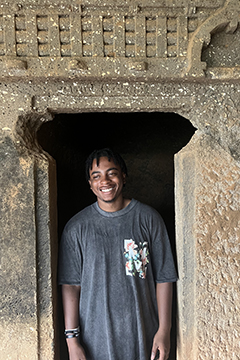 Frank Denteh visits an ancient temple in southern India. "As with many countries, the stereotypical idea of an American in India is depicted as someone with a white skin tone, straight blond or brown hair and green or blue eyes," he wrote to the Gilman program when he applied for the scholarship. "That isn't the case at all, the United States is extremely diverse with Americans of all backgrounds. My attendance on this trip will bring an open eye to how diverse the United States is." He is SUNY Cortland’s 15th Gilman Scholar, benefitting from a program managed by the U.S. Department of State. Its goal is to better prepare college students to thrive in the global economy and to expand the number of Americans studying and interning abroad. In addition, the cost of Denteh’s trip was supported through several SUNY Cortland study abroad scholarships: the Charles A. Gibson scholarship, for study abroad; the Dr. Gilbert C. Brown ’51 and Shirley Haft Brown ’51 Scholarship, for students planning careers in medical fields; and the Barry L. Batzing Scholarship, for biological sciences and health majors. From mid-July to mid-August, Denteh joined five other college students in the India: Health Equity Action Research project in Mumbai, Bangalore and Kodaikanal, in southern India led by SUNY Cortland Health Professor Jena Nicols Curtis. His coursework aims to help prepare pre-med, health, human services and psychology students for future careers. Denteh hopes the experiences gained during his international foray will improve his chances at being accepted into a medical school right out of SUNY Cortland. Those experiences included working at India’s oldest anti-domestic violence organization and visiting the Dharavi Slum, considered one of the world’s most densely populated slum with about a million people living within one square mile of buildings and shacks. During his trip, Denteh immersed himself in the daily activities of patients and providers, children and families, schools and teachers, investigating how race, ethnicity, religion, socioeconomic status, gender and gender expression, sexual orientation and geographic location shape health status and quality of life. He focused his attention on how India’s caste system compared to forms of discrimination found elsewhere; but also took time to sample other cultural differences. 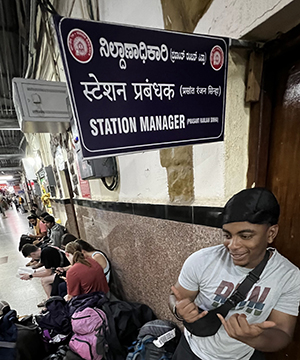 “The people in India are one of the nicest and most respectful people you will ever meet,” Denteh said. “India has a very large community aspect. The people are always looking out for one another and supporting each other despite their differences.” “One thing that I personally enjoyed seeing in India, that no matter where you visit, you’ll see different religions practiced in the community,” Denteh said. “There might be separations: those who practice Hindu here, practice (Islam) here, practice Christianity here, but altogether they really try to make it work and help one another. They do not see themselves as separated by religion but as one community.” Denteh has always lived with cultural diversity. He speaks three languages: English and two Ghanaian languages, Twi and Ga. And he’s visited the West African country of his family three times and relishes eating Ghanaian delicacies best served on a giant leaf. Now, after his eye-opening summer in India, Denteh appreciates the support responsible for a transformational experience. “I cherish this experience because a lot of students coming from minority groups are not always offered these opportunities,” Denteh said. “It was amazing knowing how much support students of minority backgrounds were getting.” Dragon duo take home thousands on new game showA network audience of more than 2 million viewers on CBS primetime this month watched a Red Dragon alumni duo compete on one of TV’s hottest new game shows and walk away with almost $40,000. For Kevin Rayo’ 17 and Billy Swenson ’15 it was a far bigger audience than the 386 seats in SUNY Cortland’s Dowd Fine Arts Theatre. The team, SUNY Cortland musical theatre majors now living in New York City, were dubbed the “City Slickers” for an episode of “Raid the Cage” — the latest version of a popular international game show brand that began in Israel. The new American iteration debuted this October on CBS with hosts Damon Wayans Jr. and Jeannie Mai. Both Rayo and Swenson said they had let people know they were interested in the idea of competing on a game show like “Amazing Race.” When someone Swenson knew became involved in casting “Raid the Cage,” the two friends were contacted. A full two-month audition process followed for a show so new that the details given Rayo and Swenson amounted to little more than, “It’s trivia, and then you’re going to take things,” Swenson recalled. 
The actual rules turned out to be a little more involved. Two teams of two contestants compete by answering questions and hauling as many prizes as they can from a giant “cage” before the door closes on them. Only the team with the highest money total from their prizes gets to keep what they won. But first, Rayo and Swenson had to make it on the show. “We had to figure out what we were going to wear and what our quote unquote ‘brand’ was going to be when we were out there,” Swenson said. Their focus was on being theater friends from college. On the show they described how they met while “trauma bonding from a forced ballet class.” Both Rayo and Swenson laughingly admitted to not being the best dancers. So, an early morning ballet class at the Dowd Fine Arts Center became a trial that they survived thanks to a shared sense of humor. “It was almost like a comedy show because we both had no idea what’s going on, and so that bonding happened in the back of class,” Swenson said. Their university performing experience also served them well during the exhausting shooting schedule for “Raid the Cage.” Swenson and Rayo said that about 300 people were in the audience watching them. For a pair used to performing in shows, it was more delightful than daunting. “We were filming for about 12 hours by the time of the last round,” Swenson said. “We would film and then, when the other team would go on, we were in another holding room in a different building, so we never knew what was happening. As those hours go on you get tired. But every time we would walk back on set, you could feel the energy from the audience and it would feel like, ‘OK. We got it. We’ve got to do this now.’ So, I feel like what we learned from school was just go on and be ourselves and just do it.” 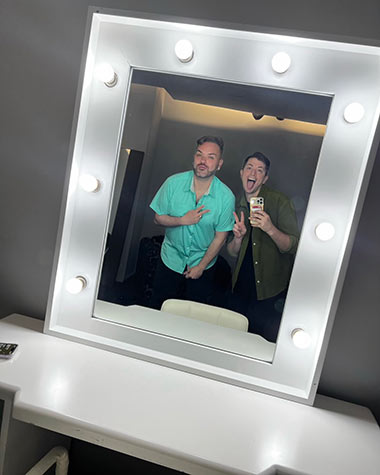
Even before they made it to the show’s set, they enjoyed the perks of being among CBS’ game show chosen. The show is filmed in Mexico City, where a Mexican version of “Raid the Cage” is also shot, so they were given an all-expenses paid flight for the trip. Once there, they were taught more about the rules of the game, including that that second-place team goes home with nothing. “That put a pit in my stomach,” Rayo said. “I think, ‘We have to win this because, 1: I’m not going on TV to lose; and, 2: I’m not going to go home without some sort of prize.’” With little prep time before filming began, they successfully jumped out to an early lead and didn’t look back. After coming up short in a final bonus round, they still left “Raid the Cage” with $39,507 in eclectic prizes that ranged from an iPhone to an electric, rideable suitcase. After the show ended, they had the option to convert their winnings to cash, a choice they were happy to make. They split the money. “I, personally, know I am just happy all the credit cards that 18- to 20-year-old me decided that I needed are finally being paid off,” Rayo joked. “If it can help us both after the split, we’ll be very happy. Getting out of the debt cloud is where all that money is going toward.” After a whirlwind 48 hours from New York City to Mexico City and back again, Swenson and Rayo had to keep the results secret until broadcast — a feat that the two found almost as tough as “Raid the Cage” itself. When their show debuted last month, they enjoyed watching it in a bar with friends and thinking back on the fun, surreal experience. “Honestly, it was one of those moments in your life where you think, ‘God, this is amazing and I don’t want this to end,” Swenson said. “When we walked on stage we were treated like royalty. The hair, the makeup. Every time was ‘Do you need a snack? You need a snack. You need, you need.’ It was just like the coolest thing and to now see it happen in a national forum was awesome.” A note of appreciation before Thanksgiving breakDear campus community, In the days leading up to Thanksgiving break, I wanted to send a note of appreciation for all that you do to make SUNY Cortland a special place. Thanksgiving is a reminder to have gratitude for the simple joys in life, and we have so many reasons to be grateful at Cortland. I am always amazed at the spirit of our campus. Despite the challenges of our times, we strive to be a community of kind, compassionate and welcoming people who work together for the common good. There are few things that I appreciate more than being a part of our wonderful university. To our students who are returning home, please be safe in your travels. Use these next several days to rest, relax and spend time with your loved ones. Enjoy your Thanksgiving traditions and take time to reflect on the people in your life for whom you are most thankful. To our faculty and staff, thank you for all that you do to make a difference in the lives of our students. To work alongside brilliant, dedicated and genuinely caring colleagues is a privilege and an honor. Wishing you all a Thanksgiving filled with warmth, joy and the shared spirit of togetherness. All the best, Erik J. Bitterbaum 2024 Orientation, advisement and registration dates setThe Orientation Committee has set the new student orientation and advisement dates for summer 2024. Below are the program dates for January, June/July and August. January 2024 January Orientation 1: Monday, Jan. 8 (online) January Orientation 2: Friday, Jan. 12 (online) January Orientation 3: Friday, Jan. 19 June/July 2024 First-Year Session 1: Wednesday, June 26 - Thursday, June 27 Transfer Session 1: Friday, June 28 (online) First-Year Session 2: Monday, July 1 – Tuesday, July 2 Transfer Session 2: Wednesday, July 3 First-Year Session 3: Monday, July 8 – Tuesday, July 9 Transfer Session 3: Wednesday, July 10 First-Year Session 4: Thursday, July 11 – Friday, July 12 First-Year Session 5: Monday, July 15 - Tuesday, July 16 First-Year Session 6: Wednesday, July 17 (online) First-Year Session 7: Thursday, July 18-Friday, July 19 First-Year Session 8: Monday, July 22 (online) Transfer Session 4: Wednesday, July 24 (online) August 2024 Transfer Session 6 and First-Year Session 10: Friday, Aug. 23 Various offices and departments work together to make these events a success and to aid our new students in their transition to SUNY Cortland. The campus community is invited to participate in these programs. New student advisement and registration will occur during the afternoons of all one-day programs and on the second day of two-day programs. Advisement and Transition will begin coordinating these efforts in March and will reach out to student services and academic departments with additional details. For program information, refer to the orientation website at cortland.edu/orientation. Direct questions about the Orientation program to Advisement and Transition.  Suggest a feature story Suggest a feature story
Faculty/Staff ActivitiesTeagan BradwayTeagan Bradway, English Department, gave an invited lecture on Nov. 8 to the Centre for Cultural Inquiry at the University of Konstanz in Germany. Her talk, “Throuple Plots: Narrative Infrastructures of Queer Kinship,” is drawn from her book-in-progress on the representation of kinship in contemporary LGBTQ+ literature and film. Jeremy Jimenez and Miranda Kistner ’23Jeremy Jimenez, Foundations and Social Advocacy Department, and Miranda Kistner ’23 had their article “Concerned but Confused: University students’ knowledge and perceptions of climate change, and how they plan to address it in their future personal and professional lives” recently published in the Journal of the Scholarship of Engagement (JoSE). Jerome O’CallaghanJerome O’Callaghan, Political Science Department, presented research at the 55th annual meeting of the Northeastern Political Science Association held Nov. 2 to 4 in Boston, Mass. The paper, titled “The Unbearable Inevitability of Content Regulation,” argues that the Supreme Court’s conventional approach to government regulation of speech is incoherent, and is fundamentally at odds with the history of the court’s decisions in speech cases. Juan Diego PrietoJuan Diego Prieto, Political Science Department, presented at the SUNY Diversity, Equity, Inclusion, and Social Justice in the Curriculum Conference: Building a Community of Practice conference, held Nov. 3 and 4 at the University at Albany. His presentation was titled “From Family and Community to the Global (and Back Again): A Writing Assignment on Lived Experiences of Political Economy.” Assistant Chief Amanda Wasson and Lieutenant Dani SalisburyAssistant Chief Amanda Wasson and Lieutenant Dani Salisbury, University Police Department, recently attended the International Association of Chiefs of Police Women’s Leadership Institute held in Saratoga Springs, N.Y. The Women’s Leadership Institute (WLI) is a one-week in-person leadership training program for women leaders and those developing women leaders. The curriculum is focused on teaching participants evidence-informed leadership theories to help them inspire followers, lead groups, and achieve organizational goals—all in the context of better understanding the unique challenges women face in the workplace.  Submit your faculty/staff activity Submit your faculty/staff activity
|
The Bulletin is produced by the Communications Office at SUNY Cortland and is published every other Tuesday during the academic year. Read more about The Bulletin. To submit items, email your information to [email protected]
© 2026 SUNY Cortland. all rights reserved.
